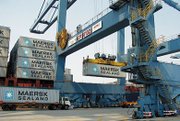Pumped-Up Fuel Prices Bump Up Shipping Costs
The price to ship apparel across the ocean from Asia has risen steadily in recent months due to mounting fuel prices, and it is about to go up again on Oct. 1.
Since Aug. 15, ocean carriers have been tacking on a $40 fuel surcharge to each container that arrives on the West Coast and is delivered to California, Oregon or Washington. For containers traveling inland, the surcharge is $137.
This is to cover fuel-price increases that have spiked more than 25 percent since the beginning of the year.
On Oct. 1, the ocean lines will be charging $46 per container traveling from Asia to the West Coast states and $158 for containers being transported inland.
“This is the first time the carriers have introduced this kind of fee, and it has to do with the surcharges passed on to them by the trucking and railroad companies,” said Niels Erich, a spokesman in San Francisco for the Transpacific Stabilization Agreement, a group of 13 major ocean carriers that carry cargo from Asia and meet to do market research and set rates.
Other fee increases in store for Oct. 1 cover bunker surcharges, or diesel fuel surcharges, that have been in effect for years. Currently, the bunker surcharge for a 40-foot container is $460. That will increase to $510. The combination of addedon fees is raising shipping rates about 15 percent for a 40-foot container coming from Hong Kong.
Up, up and away
Rising fuel prices are affecting every mode of shipping for apparel importers and manufacturers. The result is reduced profits.
“It goes right off the top,” said Robert Krieger, president of Krieger Worldwide, a Los Angeles freight forwarder and customs broker who has several apparel industry clients. “Some large apparel importers, like Liz Claiborne, might have their own contracts that don’t include bunker or fuel surcharges. But others don’t.”
Most apparel manufacturers prefer to ship their goods by sea because it is so much cheaper than shipping by air. But when orders are late or a hot item sells out quickly, air cargo is the only way to make a deadline.
Apparel companies using air cargo are the hardest hit. That’s because air-cargo fares are determined by supply and demand as well as fuel prices.
When apparel quotas were closing in April, May and June for certain goods, air-cargo rates jumped 30 percent, said Michael Madden, director of air inbound transportation for Stonepath Logistics Inc., a freight forwarder and customs broker based in Seattle.
Right now, air-cargo fees are about 10 percent higher than last year, but they are expected to climb at least 5 percent in the next six to eight weeks as retailers and manufacturers push to bring in goods for the Holiday season.
For apparel manufacturers shipping their cargo containers on trains to inland destinations, fuel surcharges started to increase this year.
At Burlington Northern Santa Fe Corp., the fuel surcharges are based on the prevailing price of diesel fuel across the country. With diesel fuel currently at about $2.73 a gallon, the shipping surcharge is 19.5 percent.
“We’ve had a fuel-surcharge program in place for at least the last five years,” said Pat Hiatte, a spokesman for BNSF Railway, a subsidiary of Burlington Northern Santa Fe Corp. in Fort Worth, Texas.
In 2006, BNSF, which is the second-largest railroad in the country, is changing the way it calculates its surcharge fees. It will start implementing its surcharge on a mileage basis, which will result in higher fees for those shipping longer distances.
At Union Pacific Corp., which operates the largest railroad in the country out of its headquarters in Omaha, Neb., surcharges didn’t go into effect until the end of last year. The railroads have been finding that as more truckers drop out of the business due to rising fuel prices, there is more demand to ship cargo containers by rail.
Independent truckers who own their own tractor-trailers have been having a harder time getting more money for their hauls. But big trucking companies have been adding fuel fees of 15 percent to 28 percent.
“There is no escape from this demon,” said Cliff Katab, senior vice president of business development at Triangle Network, a trucking company in Santa Fe Springs, Calif., that employs 170 truckers and transports goods for companies such as Kenneth Cole and Levi Strauss & Co. “Before this year, it was something we had never done. We held off as long as we could.”






















